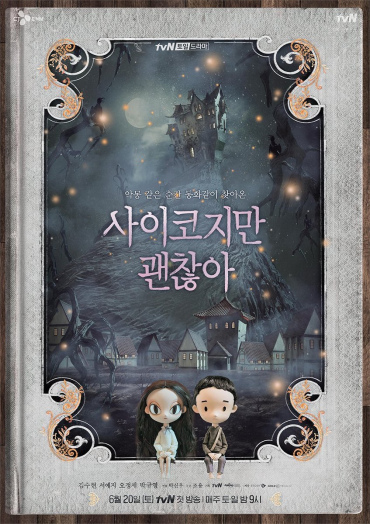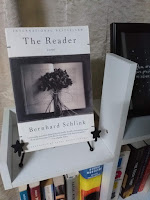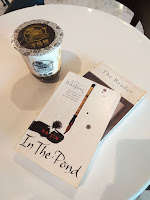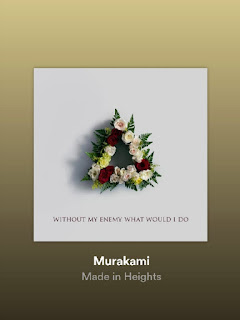What can I give you when I have little to give? I am not empty but I don't have much. Can I offer you a jest when your house bursts in laughter? Can I offer you a match when your street is lined with lamps? My love is not the quilt you use on a cold night nor a color your pick to paint your fence. It's a cobblestone you step on on your brick-paved way home, but, it is mine to give.
Simple Joys
books, thoughts, etc.
HOME
The sea calls to me
with its luring calm
humid air brushing my skin
heat I'll never tame.
They summon me all together
longing to kiss me once more
to bronze my skin
make my eyes squint.
Sand between my toes
salt wrapping my body
even my eyeballs
can taste it.
The most melodious
sound of the water
can only be heard
when I'm drowning.
Still, I'm returning.
because I miss the rain
One season lingers a little longer and people start complaining. "When is this rain going to end?" "The summer's supposed to end anytime soon and it'll be a little cool again." And while these sentiments are valid, I can't help but think of the person at a party who doesn't know that the party is already over. "Why are you still here? Don't tell me you're staying the night? Everybody has gone home." People and seasons are only welcome when they follow a certain schedule or calendar or timeline. And if you stay a little longer, prepare for ominous displays of repulsion and distaste.
I never liked the summer heat, except when I'm at the beach. I was born in a coastal city so I'm used to the sea breeze, tan lines. I was only pale during the -ber months. During the rainy season, I would wait for that heavy downpour so I could go outside and shower in the rain, sometimes alone, sometimes with neighbors, didn't matter.
Are you a frog, mama asked. Look at your clothes!
Frogs don't wear clothes. I was born in May, somebody told me I'm a Taurus.
No wonder you're stubborn.
I don't believe in zodiac signs. But I'm glad it's an Earth sign.
And your grandpa calls you Midori, the color of nature.
Mama, will this season last for 6 months or so?
I'm not sure but I'm hoping for sunny days ahead.
Thought you didn't like hot days.
So tell me, how are you supposed to dry your clothes?
Thoughts on After Dark by Haruki Murakami
The story takes place in urban Tokyo from around midnight (11:56 pm) to early morning (6:50 am). It follows a character named Mari, a 19-year-old girl who is reading alone and spending the night at Denny's. Shortly, a new character is introduced—Takahashi, a trombone player who happened to have met Mari and her sister before this encounter. Takahashi starts up a conversation with Mari about how he knew her. They talk about Mari's older sister, Eri, a beautiful part-time model who has been sleeping for months.
As the night grows deeper, Mari crosses paths with other characters. These encounters with strangers and Takahashi change how Mari feels about her current situation, family affairs, and how she navigates her own melancholia.
If you haven't read any books written by Haruki Murakami, this is a perfect prelude to his other works and worlds. Its length is less daunting, which is around 240 to 250 pages only. It uses a first-person plural "we" perspective, which gives us, its readers, the camera position, allowing us to observe the characters through a lens.
The elements of surrealism in this book are rather soft, making After Dark an ideal first Murakami experience. It doesn't contain weird sex, a vanishing elephant, a talking monkey, or anything labyrinthine.
Like other Murakami's works, this doesn't have a definite ending. It's the reading experience that matters. This dreamlike narrative will definitely put you in a trance and will have you thinking of the things that may happen to you and within you After Dark.
***
“You know what I think?" she says. "That people's memories are maybe the fuel they burn to stay alive. Whether those memories have any actual importance or not, it doesn't matter as far as the maintenance of life is concerned. They're all just fuel. Advertising fillers in the newspaper, philosophy books, dirty pictures in a magazine, a bundle of ten-thousand-yen bills: when you feed 'em to the fire, they're all just paper.”
― Haruki Murakami, After Dark
Yesterday, I Sat Down With My Demons
Yesterday, I sat down with my demons because Bukowski told me to do so
I served them tea, without milk.
No need to offer an apology for the scarcity
They know very well how impoverished I am.
There were three of them at the table but
I know there were some more.
I asked them, So what's your name?
Oh, yes, I already know.
I am you, you are me, that's what they always say
As they continued playing cards, ignoring the tea
"You're trying to poison us."
I said, no, that's not true.
I lied.
They grew bigger and uglier -
Such a fright!
So I took out a knife from my pocket,
I wondered how it got there.
I am you, you are me, again they said
They continued playing cards and ignored the tea
Okay, don't drink it, I finally caved.
I took the cups to the kitchen sink
but when I got back, only lingering echoes remained
Until next time, I whispered in the air.
On Min Jin Lee's PACHINKO
A BOOK REVIEW (Spoiler-Free)
This book follows the story of a Korean family spanning 4 generations. Hoonie, a crippled Korean fisherman, had a daughter named Sunja, who got pregnant at an early age by a wealthy fish dealer named Koh Hansu from Osaka. However, Koh Hansu later revealed that he had a family in Japan but was still willing to keep and support Sunja and the child. She refused the offer and cut ties with him. Sunja conceived the child with the help of Baek Isak, a Christian minister who stayed in Sunja’s family boarding house. Baek Isak willingly married Sunja and promised to be a father to Noa, the child.
The couple was able to make it to Osaka and was accommodated by Baek Isak’s brother and his wife. And from there, began the life-changing journey of Sunja and the other characters in a land where they were left with no choice but to make it through each day.
It’s a story of survival, resilience, finding a home in a foreign land where discrimination creeped in, lingered, and stung.
This seemingly colossal book narrates the highlights of multiple characters, which allows the readers to look at and experience different perspectives. The story’s main character is Sunja, whose values remained impeccably intact to the very last page. She could be every reader’s potential favorite, as she embodied strength as she evolved from a naïve village girl to a strong-willed woman.
Aside from a refreshing fill of individuality from each character, the author’s writing style was this genre’s perfect match. It is rather dry and straightforward but the tone is still victorious in letting readers identify with the characters. It is apparent that this was thoroughly researched and the plot well-thought of. According to the author, Min Jin Lee, she did a lot of interviews and tremendous study before coming up with the chronology, which is basically an intricate mosaic of stories of people she interviewed.
This novel is a treat - a whirlwind of emotions. However, towards the end, it felt a bit rushed, which I have encountered in other books too.
In all, Pachinko is a character-driven family saga and historical fiction that documents bittersweet experiences of people who lived during the time when Japan annexed Korea.
Do not get intimidated by the size of the book and how it’s divided into 3 parts because it’s an absolute page-turner!
Pachinko, if you’re wondering, is a slot/ pinball machine, which originated and is a famous game in Japan. This business evidently played a big part in the story as it was both their shame and holy grail.
I highly recommend it.
Rating: 9/10
IT'S OKAY TO NOT BE OKAY: THEMES AND TAKEAWAYS
Dear Murakami
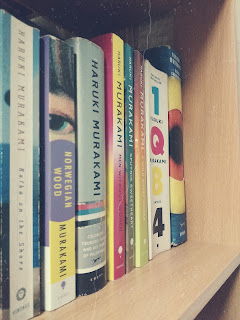
I had the privilege to meet you 5 years ago when a friend of mine handed me her copy of Norwegian Wood. The spine of the book had folds; the pages showed some tanning, dog-eared. Giving it a shot wouldn’t hurt, I thought to myself.
Weekend came and given the right amount of motivation and curiosity, I started reading it, unaware of the passing time. I forgot to sleep. Thanks to the soda I downed while reading.
Apparently, people read to find answers to their questions but the moment I finished the book, it posed more questions. But in a good way. The pleasure only uncertainty and ambiguity could give.
I had so many queries about your books that baffled me for some time but now I prefer them not answered. Maybe it’s your intention to let us, your readers, come up with our own version. Perhaps our interpretations are also based on our own realities.
Most of my questions are rhetorical. Questions out of awe. Like how could you put into words the innermost thoughts of a person, which is a very complex living creature? The characters were realistic, if not fully. Maybe some of the qualities of your characters are extreme. Okay maybe this varies depending on the network your readers personally know.
But one thing’s for sure: I found myself in almost every character in your books. Maybe it’s how they make their coffee, the way they quaffed their beer, the way they stammer, act dismissive, manage anxieties, muster courage and take risks.
I became Midori, Aomame, Nakata, Fuka-eri, the cats, the toughest 15-year-old Kafka, your nameless protagonists.
Like my friend told me the other day, you “captured her loneliness in a perfect way.” I couldn’t agree more. You made me feel we weren’t alone in our struggles. We felt understood. We became less afraid of judgment. And ultimately, you gave us a way to understand ourselves better and love the traits in us that the world didn’t care to notice.
So I told my friend, well, Murakami is like the best thing we never knew we needed.
On Bernhard Schlink's THE READER
I don't have any intention to narrate the plot summary here. That is Wikipedia's job. I just want my abstract thoughts laid out.
The main character had his dilemmas, which made me ask questions like: Can you possibly choose what to feel towards a person? Is it impossible to love again with the same intensity as you did in the past? Did "the reader" feel regretful when he realized he was not responsive enough when the time demanded it?
Men can be complicated, too, by not showing enough, by not giving or saying enough. When I thought of complexity, I could picture out disorderliness, of many things. After reading this book, I've learned that complexity is not in the excessiveness of things but also in the lack of them. It is not just in the plethora of showing affection but in the dearth of it.
Will definitely reread after a few years.
On Ha Jin's IN THE POND
In the Pond is a satire that tells a story of a fitter, a political activist, an artist, a calligrapher, a family man, and a scholar, all in one, who fights for his rights and refuses to give way to any form of oppression.
In the thick of threatening power turned turmoil, the protagonist allows us to see what it is like to live a life filled with injustice and misery.
Despite the presence of these heavy themes, the author managed to make the story bearable to the readers by adding timely humor.
GREAT FINDS
Song Title: MURAKAMI
Artist: Made in Heights
Some lines that captivated me:
It's just a story though, is it a story though?
I can't tell if it happened 'cause it felt impossible
Don't know whether it was real or dream
Imagination playing tricks on me
Song Title: MURAKAMI
Artist: Jason Reeves
Some lines that captivated me:
I chased that sheep
All the way out to Hokkaido
I couldn't find a thing
Anywhere, and I felt so alone
That I traveled back to Tokyo
To walk those neon streets
Weaving like
That you drew in silence
While your
And Bernstein vinyl played
Listening to every mark they made
These last few days were serene. Just me enjoying the peace and quiet. I feel like I'm on an island but I get to access anything in the mainland if I want to, but most of the time choose not to. Music, coffee, books, some amicable conversations, good food. I could not ask for more.
THOUGHTS ON ANNOTATING BOOKS
I brewed coffee, added some milk to it and I just can't seem to put myself to sleep yet. I still feel full from having some fried sweet potatoes in butter. What a lovely snack after doing the chores.
I want to write my thoughts on annotating books. This year, I stumbled upon an article by Mortimer Adler, titled How to Mark a Book. It is from The Saturday Review of Literature, July 6, 1941. He wrote about annotating books and why we should mark our books to truly own them. Well, of course, that is if the books were purchased by you or they were given as a gift. He also mentioned the 3 types of book owners. I really loved the article and I have shared it with some of my book-lover friends.
I didn't usually write in books. I usually kept them good as new, although I didn't develop the habit of covering them with vinyl, plastic, or paper. But this year, I made a 180-degree change by writing in the books I've read and I felt better by doing so. I made notes on new vocabularies, wrote down my immediate reactions, some sentiments I wanted to share as if talking to the author. I highlighted sentences, underlined funny remarks, circled unusual names and words. Annotating is leaving imprints of you. Writing in books means sharing some pieces of your thoughts and soul.
Normally, I highlight using my Stabilo in pastel green because it's not overwhelming to look at. Green because, duh, it's my favorite color. If I need to make some notes, I use a 0.5 mechanical pencil or 0.3 Pilot G-Tech since it's micro-fine. Notes are usually placed in margins.
I do reread books. I tried rereading one of the books that I made some notes in and I was so happy to see the annotations. They were actually helpful and made things easier for me when it comes to speed and keen comprehension. Felt like reading a journal or diary entry. In my opinion, marking a book can come in handy when you need to do a book review and you want it to be as detailed, as personal, and as comprehensive.
I want to add some pics but they are yet to be taken. Will try to make some updates asap.
Approximately 68 Weeks Ago
Some words we hear are as sharp as a sword.
We get bruised by judgments and worse even wounded.
If we are too weak, we are taken down with a single blow of ridicule.
We call it a BATTLEFIELD,
and it's not even a place.
Then there are times that we don't need to be tough.
It's totally okay to let your guard down.
There isn't a need for a shield because hugs won't hurt,
The warmth you'll feel will not burn you.
And again it's not even a place.
We call it HOME.
PURSUIT
THOUGHTS ON HARUKI MURAKAMI'S KILLING COMMENDATORE
Killing Commendatore didn't leave me with so many questions unlike most of his previous works. Most of my queries were answered and the ending was pretty much like an ending, if that makes sense. It ends positively, happily maybe. It wouldn't leave you saying "What?! What just happened?"
Then the readers get to decide and interpret everything unwritten and concealed.
But this one has a definite ending - not very common of a Murakami book but soothing and relieving.
I like the idea that the main character/ narrator's name is not revealed and there is no need for that so it's okay. Coming up with Idea and Metaphor as characters was creative and successful. Highly impressive.
- The Path of Metaphor
- believing someone/ something actually exits
- Art
- your inner power when alone
On Khaled Hosseini and his books
May 30
What can I give you when I have little to give? I am not empty but I don't have much. Can I offer you a jest when your house bursts in l...
-
Characters (Main) Ko Munyeong - writer (writes children's books); anti-social Moon Gang-tae - caregiver, spent most of his life looking...
-
Yesterday, I sat down with my demons because Bukowski told me to do so I served them tea, without milk. No need to offer an apology for the ...




